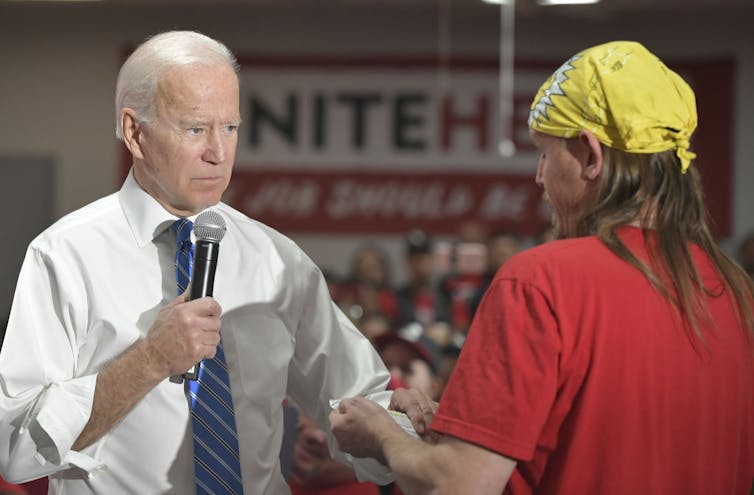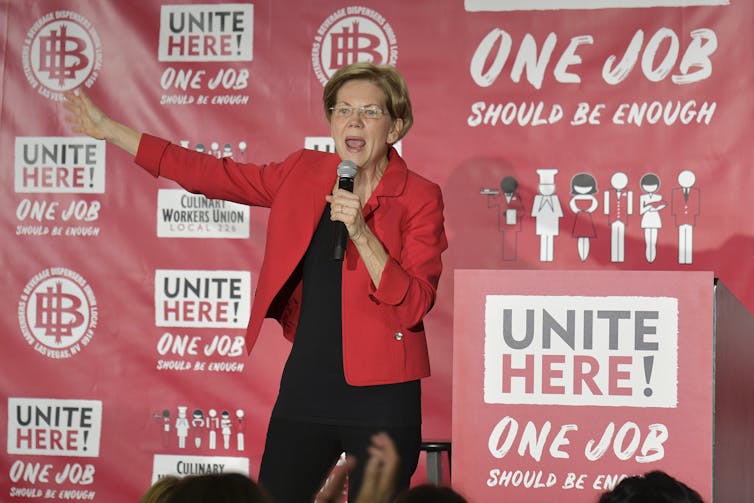Trump’s victories in key swing states showed that Democrats had to focus more on workers’ support, writes .

By Ruben J. Garcia
The Conversation
Organized labor’s clout in the Democratic Party is growing. For evidence, look no further than the small California food services union that nearly managed to shut down a presidential debate.
Unite Here Local 11, which represents 150 cooks, dishwashers, cashiers and servers, had planned to picket Thursday night’s debate at Loyola Marymount University in Los Angeles, where they work for Sodexo, a food contractor. The dispute involved their struggle to negotiate a collective bargaining agreement on better terms.
All seven candidates invited to participate, starting with Sen. Elizabeth Warren, said they would refuse to cross a picket line to take the stage.
After the candidates pulled out and Democratic National Committee Chairman and former U.S. Labor Secretary Tom Perez got involved, the national spotlight helped the groups quickly secure a deal that allowed the event to take place. The tentative agreement included a three-year contract, a 25 percent increase in compensation and a 50 percent drop in health care costs for the workers, many of whom make at or slightly above the minimum wage.
That the labor movement is a key constituency for the Democratic Party is hardly new. But I believe, in part based on my research on unions in Nevada, there are some differences that may make labor even more important as we head into 2020.

The first difference is the electoral map.
Today, many of the places where labor is strongest are key swing states like Michigan, Wisconsin, Pennsylvania and Nevada, with union membership near or above 10%. In states like these where the margin of victory is expected to be very tight, union members will be critical for the Democratic nominee.
Going into the 2016 election, these states were expected to be safely “blue” in favor of Hillary Clinton. But President Donald Trump’s victories in places like Michigan and Pennsylvania show that none of them can be taken for granted, putting more attention on gaining workers’ support.
Second, with the decline in manufacturing in the Upper Midwest, service unions have become especially important. This matters because service unions, which interact with the public much more than manufacturing workers, can bring more publicity and political clout to their labor disputes in schools, hotels and the streets of heavily populated urban centers.
One of the most powerful examples is the Culinary Workers Union in Las Vegas, which is affiliated with Unite Here. The union recently hosted three top Democratic candidates – Joe Biden, Bernie Sanders and Elizabeth Warren – to address its members as it mulls which one to back ahead of the Nevada caucuses in February 2020.
The union is seen by many as responsible for flipping Nevada’s state legislature and the governor’s mansion from red to blue in recent elections. And its get-out-the-vote operation helped the Democratic candidate in the last three presidential elections pick up the state. This strength of labor in what is a right-to-work state – which allows workers to not pay any dues to the union that represents them – is what I have dubbed the “Nevada paradox.”
The fact that Unite Here used the Democratic debate to help its cause is no accident. Its president, Donald “D” Taylor, has been vocal about the need for the Democratic Party to not take labor’s support for granted.
On issues like health care, immigration and efforts to organize at nonunion casinos on the Vegas strip, Taylor has demanded that candidates back up their words with action, including walking the picket line if necessary.
As such, his union has been a model of political engagement for the rest of the labor movement. And it shows that the candidates should expect organized workers to have a larger voice than usual as they vie to be the nominee to take on Trump.![]()
Ruben J. Garcia is professor of law and co-director of UNLV Workplace Law Program at the University of Nevada, Las Vegas.
This article is republished from The Conversation under a Creative Commons license. Read the original article.
The views expressed are solely those of the author and may or may not reflect those of Consortium News.
Please Make Your End-of-Year Donation Today.
Before commenting please read Robert Parry’s Comment Policy. Allegations unsupported by facts, gross or misleading factual errors and ad hominem attacks, and abusive or rude language toward other commenters or our writers will not be published. If your comment does not immediately appear, please be patient as it is manually reviewed. For security reasons, please refrain from inserting links in your comments, which should not be longer than 300 words.

“Almost” is the key word. Our politicians in both parties have stopped DOING. They tweet and threaten and pretend, but nothing ever happens, nothing ever changes.
They didn’t want to cross the picket line? They could have just went down to Skid Row; no unions there.
The Democrats are the party of organized labor leaders, but no so much the party of organized laborers. If they want to regain the votes of laborers, they need to stop referring to them as irredeemable deplorables and drop the wacky identitarian cultural purity tests. Do you think those dishwashers want to hear about their ‘white privilege’ from ivory tower highly paid college administrators? Do you think they believe for one second that they believe women can have penises and men can have vaginas? Do you think most of them would be happy about mandatory gun confiscation/buyback programs where law-abiding citizens have to give up their guns while criminals keep theirs? The reason they voted for Trump is he doesn’t openly despise them and the things they believe in. Until the Democrats stop branding every Trump supporter as a racist troglodyte and sneering about ‘smelling the Trump support’ at the local WalMart, they are going to have a hard time winning their votes.
Let’s keep singing “Which Side Are You On” everywhere Democratic Party prez candidates campaign, kiss babies and promote themselves as friends of the working class. Maybe the DNC will hear our demands and allow real change to come. But probably not. Most all have promises to keep to their corporate donors. The super-delegates are poised to crown the pre-selected nominee at the Convention. Deja vu all over again …